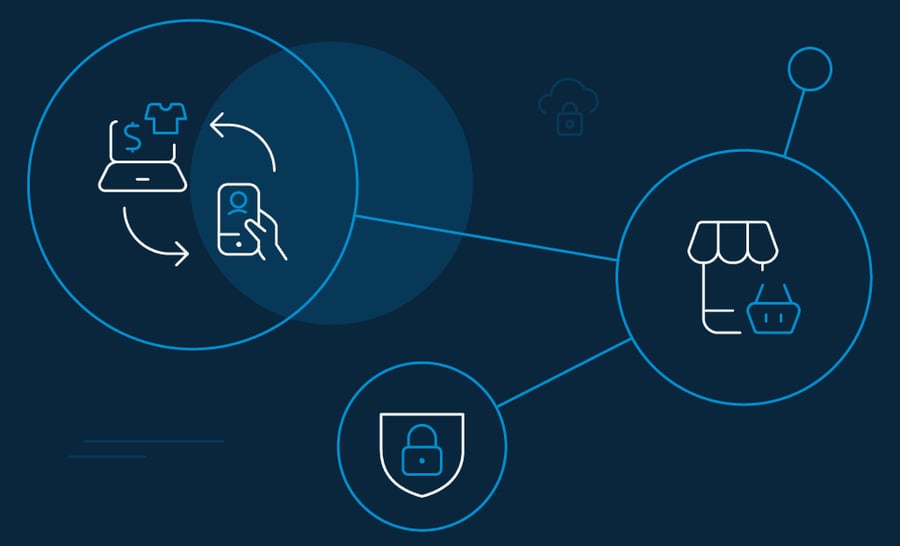
Ecommerce websites have always been one of the most common targets of digital attacks. For digital thieves, it is a treasure trove full of personal and financial information about active customers.
Once a business’s security has been breached, it leads to data loss and depletes the trust that could have been gained over the years.
And here’s a worrying fact: eCommerce websites experienced 32.4% of successful cyberattacks in 2018.
Therefore, it’s become crucial for serious businesses to employ a robust eCommerce digital security protocol and measures to keep the company and customers safe from online attacks.
This attacking and defending is a constant game of cat and mouse that will probably never stop. In this game, online retailers are constantly adding layers of technology to secure the transaction.
But at the same time, cyber attackers are investing extra hours into finding out additional loopholes.
The wisest way to move forward is by completely understanding digital security and why it is so vital for eCommerce.
In this article, we will provide you with an ample amount of information for a clear understanding. Moreover, we'll also look into some of the biggest eCommerce security threats and some measures to cover you even when you're offline. So, without any further ado, let's get into it.

Understanding eCommerce Digital Security
If we have to put it into simple terms, we can say that eCommerce digital security is a set of guidelines.
These guidelines work towards ensuring that all the transactions happening through the internet are safe.
Users who engage in online selling and buying goods and services are protected by several protocols that are part of these guidelines.
Any eCommerce business must have basic security in place to win the customers' trust in the long run.
Such basic security includes - Privacy, Integrity, Authentication, and Non-repudiation. For an eCommerce business, taking care of these four pillars is as crucial as having a secure WiFi connection.
Privacy
Prevention from all the activities that result in sharing customer data with unauthorized third parties is called Privacy. In the eCommerce business, you must ensure that customer data and account details stay between the retailer and the customer only, and no third party is included.
Most of the time, the sellers are responsible for the breach of confidentiality when they let others have access to private data. As an online business, it is your job to enable at least a bare minimum of firewall, anti-virus, encryption, or other data protection. It will help you in ensuring your customers that their card and payment details are safe with you.
Integrity
This is also a vital concept of security in eCommerce. Integrity means ensuring that whatever information the customers have shared on the internet remains unchanged. According to this principle, the information shared by the customer should be used only for the reason it was needed.
If you make even the slightest of alterations in the data entered by the customer, they'll start to lose faith in the security and integrity of your business.
Authentication
The authentication principle is there to ensure that both the buyer and the seller are genuine. They must be who they claim to be. Businesses selling a product have to prove the authenticity of their existence, their product, and whether they deliver on their promises.
The same goes for the other side. Customers should also prove their identity to make the seller feel secure about the transaction. Authentication and identification are something many eCommerce businesses are doing, so we know that it is a practical approach.
Non-Repudiation
The word 'repudiation' means denial. And as the name suggests, the non-repudiation principle ensures that neither party can deny the actions they have performed throughout a transaction.
Both the seller and the customer should move forward with the transactions they have initiated. Many people, because of the virtual nature of transactions, feel eCommerce to be less secure. In this situation, the non-repudiation principle acts as a layer of protection.
6 Reasons Why Digital Security is Vital
With the increase in online transactions, the eCommerce industry has grown a lot in the past few years.
However, threats and invasions from malicious actors have also increased. Ecommerce is one of the most vulnerable industries when it comes to digital attacks.
Digital security has a notable impact on the eCommerce sector, so here are six reasons why it is so vital for eCommerce success.
1. Reduces Customer Churn
For any business, customer retention is one of the top priorities, and it is not easy as many people consider it to be.
It takes an extraordinary approach to ensure that the customers who make a purchase once are interested in making it again and again.
A loyal customer who purchases the product and services, again and again, is fully invested in the company. In the same way, the company should also be invested in the customer.
To reduce the churn rate, it is essential to create a foundation of trust. To foster trust, you have to be very transparent and upfront with your data collection methods and procedures.
Consumers also expect to be able to reach your business whenever they need to with personalized support for a seamless customer journey.
You have to take the necessary steps and communicate the protocols. Moreover, you can make your customers feel more secure by creating a publicly available document describing the precautions you are taking to protect them.

Making data privacy a priority will allow you to make your customers advocates for your services and products.
You can ask customers how they feel about the current privacy policy through various surveys and feedback forms.
2. Protects Corporate Assets
Your workforce must have skilled, responsible, and result-oriented individuals to manage the eCommerce business.
You'll need a diverse and knowledgeable team from multiple backgrounds and with unique talents to assist your customers and provide promising business continuity.
Suppose you wish to maintain a high level of efficiency and perform tasks optimally. In that case, you'll have to allow your employees to access a certain level of data from your customer database.
This can be data from support tickets, demographics, internal documents, financial statements, and much more.
However, you can't allow everyone to access this data. You must restrict its access from the ones who should not see it.
Balance out the risk associated with the misuse of your confidential and invaluable data, and ensure the database resources are used appropriately by asking users to verify their credentials.
3. Improves the User Experience
UX design and convenient navigation play an essential part in impressing a consumer and determining how they see your brand.
User-friendly and stylish sites go a long way in attracting customers and making it seamless to browse content and products.
On the other hand, poorly designed sites can make your customer leave the site and never revisit it in the future.
If your data collection notifications are not very clear, customers might not want to interact with your eCommerce site, which means you'll have a shortage in sales.
A digitally secured site will not bombard customers with many requests to accept cookies, user agreements, and complex data disclosure forms. Such policies take credibility away from your site and make it look less secure.
It is crucial to ensure that all the forms are presented neatly so that the customers don't get intimidated.
Good user experience and design can help improve the satisfaction of users, and more importantly, make them feel safer.
4. Boosts Employee Competence
Training employees to understand threats and determine their level of seriousness is very crucial for the success of any eCommerce business.
When your employees are adequately educated about the best practices, they can act as the front line to prevent hackers and viruses from entering the enterprise.
Phishing agents send emails to tons of corporate emails at once. At first glance, these emails can appear legitimate as they address employees with their correct names and use relevant subject lines to lure them into opening them.
Once they open the email, the downloadable attachments that contain viruses can enter their system and compromise their data.
These agents are not complete professionals, though, which is why they leave sure signs which you can identify. Avoid downloading any content with an unknown origin.
5. Optimizes Business Processes
Companies are updating their software to increase functionality and make systems capable of completing required tasks.
Most of the updates contain vital improvements in terms of security. It can clear out bugs, which results in speeding up the process.
With time, the updates can pile up, so it is crucial for you to always keep an eye out for them. You should also update your eCommerce site and application to clear out any bugs and give your customers a better experience.
When you weave security into eCommerce optimization, everything will be running smoothly.
6. Protects from Ransomware
Another digital security threat for eCommerce businesses is ransomware, a type of malware that encrypts a business's data.
The data or system can only be unlocked in exchange for a considerable sum of money. Any data that you have stored in your system can be at risk from ransomware.
Not only can your device be affected, but there have also been some instances of ransomware attacks on cloud storage.
However, cloud storage is still considered by many to be a safer option and more and more businesses are opting to use it.
The only way to protect yourself from this type of attack is by being prepared for it. And how do you do this?
You can do prepare by creating a backup of your important files in multiple places. This shouldn't be limited to cloud services, but also locally and on portable storage devices.
Biggest Security Threats to eCommerce Sites
There are numerous types of digital attacks you might face as an eCommerce business. And it is not possible to talk about even half of them in this blog post.
However, some attacks are happening more frequently, and everyone should know about them. Let's see what those are.
Phishing
This is a type of social engineering method used by attackers to trick victims into providing personal and confidential information like accounts, passwords, social security numbers, and much more. It is typically done via email, phone calls, or texts.
Phishing is a form of digital security threat that evolves the most. In eCommerce, this data privacy attack can cause devastating damage to both businesses and customers.
There are numerous types of phishing too, but let's not get into that here. If not identified properly, phishing can ruin the reputation of brands.
Malware and Ransomware
If your site is loaded with malware or ransomware, your customers might get their devices infected which can lock them out of their system and important data.
When your customers face an experience like this, the chances of revisiting your website are next to none.
Sometimes even your server can get infected, which can result in serious downtime. Downtime is expensive for any business, let alone eCommerce. But with regular site checks and maintenance, you can avoid a situation like this.
SQL Injection
This is a type of digital attack in which hackers use SQL (Structured Query Language) code to tamper with the database and gain access to valuable pieces of information through it.
This type of attack is one of the most prevalent ones on the internet, and attackers can potentially use it against any web application or website that has used an SQL-based database. Since SQL is used in most eCommerce sites, they are quite vulnerable to this attack.
Cross-Site Scripting (XSS)
In cross-site scripting (XSS), several malicious scripts are injected into benign and trusted websites.
When an attacker uses a web application to inject malicious code to different end-users, generally it is in a side script.
An attacker can use XSS to send a malicious script to an unsuspecting user. The end-user will never know what the script contains, and when executed, it will do the harm it was meant to do.
Final Words
Ecommerce digital security is a process that requires constant checks and eagle eyes to spot foul play.
Digital security is something that cannot be compromised in this world of severe cyberattacks. Once you take some measures to prevent it, your customers will feel secure when making purchases and transactions through your online store.
The reasons listed above should be enough for your eCommerce company to start working on securing it digitally.





Leave a reply or comment below